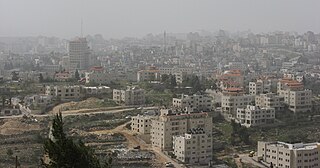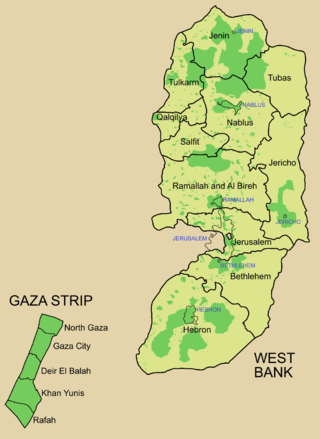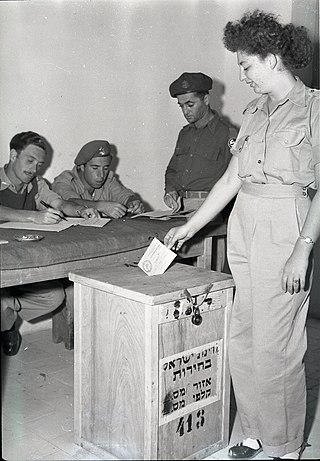
The Palestinian National Authority, commonly known as the Palestinian Authority and officially the State of Palestine, is the Fatah-controlled government body that exercises partial civil control over West Bank areas "A" and "B" as a consequence of the 1993–1995 Oslo Accords. The Palestinian Authority controlled the Gaza Strip prior to the Palestinian elections of 2006 and the subsequent Gaza conflict between the Fatah and Hamas parties, when it lost control to Hamas; the PA continues to claim the Gaza Strip, although Hamas exercises de facto control. Since January 2013, the Palestinian Authority has used the name "State of Palestine" on official documents, although the United Nations continues to recognize the Palestinian Liberation Organization (PLO) as the "representative of the Palestinian people".

The Palestine Liberation Organization is a Palestinian nationalist political and militant organization founded in 1964 with the initial purpose of establishing Arab unity and statehood over the territory of former Mandatory Palestine, in opposition to the State of Israel. In 1993, alongside the Oslo I Accord, the PLO's aspiration for Arab statehood was revised to be specifically for the Palestinian territories under an Israeli occupation since the 1967 Arab–Israeli War.

Local government is a generic term for the lowest tiers of public administration within a particular sovereign state. This particular usage of the word government refers specifically to a level of administration that is both geographically localised and has limited powers. While in some countries, "government" is normally reserved purely for a national administration (government), the term local government is always used specifically in contrast to national government – as well as, in many cases, the activities of sub-national, first-level administrative divisions. Local governments generally act only within powers specifically delegated to them by law and/or directives of a higher level of government.In federal states, local government generally comprises a third or fourth tier of government, whereas in unitary states, local government usually occupies the second or third tier of government.

The Interim Agreement on the West Bank and the Gaza Strip commonly known as Oslo II or Oslo 2, was a key and complex agreement in the Israeli–Palestinian peace process. Because Oslo II was signed in Taba, it is sometimes called the Taba Agreement. The Oslo Accords envisioned the establishment of a Palestinian interim self-government in the Palestinian territories. Oslo II created the Areas A, B and C in the West Bank. The Palestinian Authority was given some limited powers and responsibilities in the Areas A and B and a prospect of negotiations on a final settlement based on Security Council Resolutions 242 and 338. The Accord was officially signed on 28 September 1995.
A town council, city council or municipal council is a form of local government for small municipalities.

Tubas is a Palestinian city in the northeastern West Bank, located northeast of Nablus, west of the Jordan Valley. A city of over 63,000 inhabitants, it serves as the economic and administrative center of the Tubas Governorate of the State of Palestine. Its urban area consists of 2,271 dunams. It is governed by a municipal council of 15 members and most of its working inhabitants are employed in agriculture or public services.

Elections for the Palestinian National Authority (PNA) were held in Palestinian Autonomous areas from 1994 until their transition into the State of Palestine in 2013. Elections were scheduled to be held in 2009, but was postponed because of the Fatah–Hamas conflict. President Mahmoud Abbas agreed to stay on until the next election, but he is recognized as president only in the West Bank and not by Hamas in Gaza. The Palestinian National Authority has held several elections in the Palestinian territories, including elections for president, the legislature and local councils. The PNA has a multi-party system, with numerous parties. In this system, Fatah is the dominant party.

Beit Sahour or Beit Sahur is a Palestinian town east of Bethlehem, in the Bethlehem Governorate of the State of Palestine. The city is under the administration of the Palestinian National Authority. The population was of approximately 14,000 in 2017, consisting of approximately 80% Christians and 20% Muslims.

The Palestinian government is the government of the Palestinian Authority or State of Palestine. The Executive Committee of the Palestine Liberation Organization (EC) is the highest executive body of the Palestine Liberation Organization and acts as the government. Since June 2007, there have been two separate administrations in Palestine, one in the West Bank and the other in the Gaza Strip. The government on the West Bank was generally recognised as the Palestinian Authority Government. On the other hand, the government in the Gaza Strip claimed to be the legitimate government of the Palestinian Authority. Until June 2014, when the Palestinian Unity Government was formed, the government in the West Bank was the Fatah-dominated Palestinian government of 2013. In the Gaza Strip the government was the Hamas government of 2012. Following two Fatah–Hamas Agreements in 2014, on 25 September 2014 Hamas agreed to let the PA Government resume control over the Gaza Strip and its border crossings with Egypt and Israel, but that agreement had broken down by June 2015, after President Abbas said the PA government was unable to operate in the Gaza Strip.
Palestinian National Initiative is a Palestinian political party led by Mustafa Barghouti.
A municipal council is the legislative body of a municipality or local government area. Depending on the location and classification of the municipality it may be known as a city council, town council, town board, community council, rural council, village council, or board of aldermen.

Al-Bireh, al-Birah, or el-Bira is a Palestinian city in the central West Bank, 15 kilometers (9.3 mi) north of Jerusalem. It is the capital of the Ramallah and al-Bireh Governorate of the State of Palestine. It is situated on the central ridge running through the West Bank and is 860 meters (2,820 ft) above sea level, covering an area of 22.4 square kilometers (8.6 sq mi). Al-Bireh is under the administration of the Palestinian National Authority.

The next Palestinian legislative election was scheduled for 22 May 2021, according to a decree by President Mahmoud Abbas on 15 January 2021, but was indefinitely postponed on 29 April 2021.

A municipality is an administrative unit of local government similar to a city. They were established and decided after the creation of the Local Government Ministry of the Palestinian National Authority in 1994. All municipalities are assigned by the Local Government Ministry. Municipal council members and mayors are elected by the residents of the particular locality. Municipalities are divided into four sectors depending on their population and importance to their particular governorate.

The president of the State of Palestine is the head of state of Palestine. Yasser Arafat became the first titular president of the State of Palestine in 1989, one year after the Palestinian Declaration of Independence. The title was originally titular, in parallel with the de facto title president of the Palestinian National Authority. Both functions were held by Arafat from 1994 and continued until his death in November 2004, and was continued by his successor Mahmoud Abbas. In January 2005, the Palestinian Central Council (PCC) asked Abbas to perform the duties of the president of the State of Palestine. In November 2008, the PCC approved the continuation of Abbas's function as president of the State of Palestine. Since 2013, the title president of the State of Palestine became the sole title of the Palestinian president.
Local bodies in Tamil Nadu constitute the three tier administration set-up in the South Indian state of Tamil Nadu. It is a system of local government which forms the last level from the Centre. Chennai Corporation in the then Madras Presidency, established in 1688, is the oldest such local body not only in India but also in any commonwealth nations outside United Kingdom.

Municipal elections in Israel are elections in which the residents of the cities and local councils in Israel vote for the chairman of the local authority, as well as for members of the city councils or the local councils.

The Oslo Accords are a pair of agreements between Israel and the Palestine Liberation Organization (PLO): the Oslo I Accord, signed in Washington, D.C., in 1993; and the Oslo II Accord, signed in Taba, Egypt, in 1995. They marked the start of the Oslo process, a peace process aimed at achieving a peace treaty based on Resolution 242 and Resolution 338 of the United Nations Security Council, and at fulfilling the "right of the Palestinian people to self-determination". The Oslo process began after secret negotiations in Oslo, Norway, resulting in both the recognition of Israel by the PLO and the recognition by Israel of the PLO as the representative of the Palestinian people and as a partner in bilateral negotiations.

The president of the Palestinian National Authority is the highest-ranking political position in the Palestinian National Authority (PNA). The president appoints the prime minister of the Palestinian National Authority, who normally requires approval of the Palestinian Legislative Council, and who shares executive and administrative power with the president.










